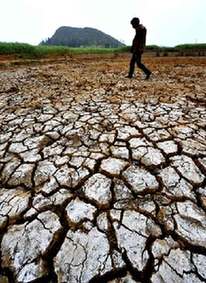Drought aggravates inflationary pressure
 The drought in Southwest China will not affect the consumer price index (CPI) much, analysts said, but has added inflationary pressure due to surging prices of agricultural products.
The drought in Southwest China will not affect the consumer price index (CPI) much, analysts said, but has added inflationary pressure due to surging prices of agricultural products.
"Food prices have increased a lot recently, and we even cannot afford vegetables," Li Gancun, a 47-year-old restaurant manager, said Monday in Kunming, capital of Yunnan Province.
She said vegetables prices had tripled and rice prices had increased by 10 percent.
The drought has resulted in decreased output of agricultural products in Yunnan, Guizhou and Sichuan provinces, as well as the Guangxi Zhuang Autonomous Region, igniting market concerns of soaring food prices and inflation.
"The drought has affected grain output and prices in China's southwestern regions, but will not affect the national grain supply and prices much," said Ding Shengjun, a researcher at the State Administration of Grain.
Ding said the southwest regions are not the country's major grain production areas, and contribute 19 percent of China's total grain output and 5 percent of wheat output, and China has abundant food reserves amounting to 250 billion kilos.
"The drought will not threaten the nation's food security," he said.
The International Monetary Fund said March 21 that countries in Southeast Asia are more vulnerable to climate changes which threaten their food security.
The decreasing grain output of Vietnam and Thailand, which supply nearly 40 percent of global grain exports, will boost international grain prices, according to Ding. "It might boost domestic grain prices moderately, as China does not rely much on the international grain market," he said.
The drought will not cause the CPI to increase, said Xu Kunning, director of the pricing department of the National Development and Reform Commission, in late March.
China's CPI rose 2.7 percent in February from a year earlier, hitting the highest level in 16 months, and came close to the 3 percent full-year target limit set by the central government.
"The drought will bring more inflationary pressure rather than the CPI hike," said Zhu Baoliang, chief economist at the State Information Center.
 0
0 






